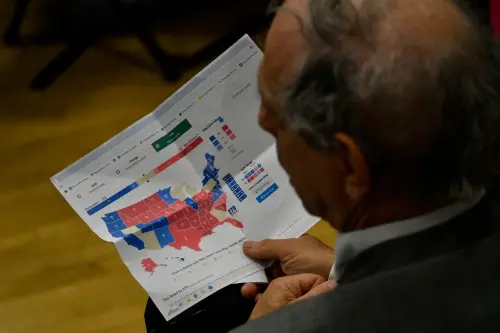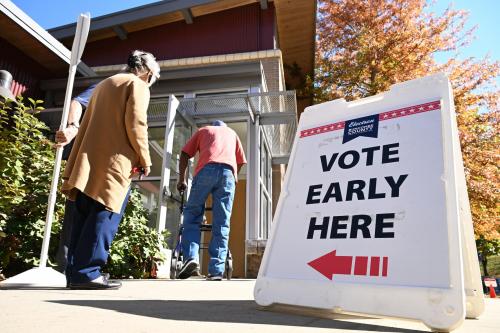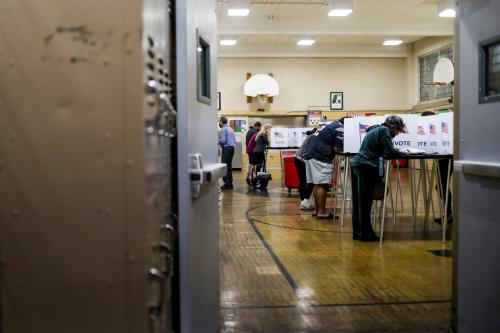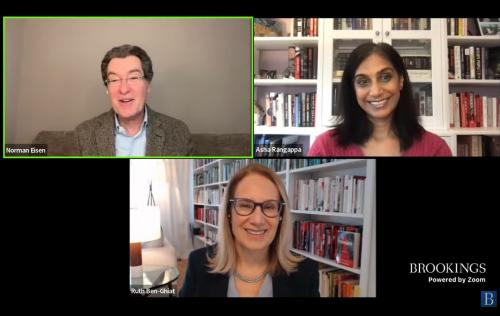The 2024 presidential race will almost certainly be very close, especially in the few swing states that could decide the Electoral College vote. Hence, a great deal of attention has been paid to the question of “spoilers”—third party or independent candidates who could pull enough votes from President Joe Biden or former President Donald Trump to keep one of them from winning an important state. Now that No Labels has decided not to run a presidential candidate, there are three third-party campaigns going on—one by Cornell West, an African American former Harvard professor who is running as an independent, and another by Jill Stein, who ran as the candidate of the Green Party in 2012 and 2016. And finally, the one getting the most attention, and according to polls the most support, is an independent run by environmentalist and anti-vaxxer Robert F. Kennedy Jr., nephew of former President John Kennedy.
For any of these candidates to actually win, they need to first qualify for the ballot in at least enough states to account for 270 electoral votes. That is highly unlikely given the difficulty of getting on ballots in the first place. But for any of these candidates to be a spoiler, they need only get on the ballot in a few swing states. Remember that in Arizona and Georgia in 2020, Biden won by .3% of the vote. When races are that close, third-party candidates can become spoilers.
Of the three most talked about “spoilers,” Jill Stein has the best chance of getting on a large number of state ballots. She is substantially ahead in the delegate count for the Green Party’s virtual convention in July and likely to be the nominee. Because the Green Party has been around since 1984, they have state party organizations, and they have run candidates for office.1 Even though they don’t have very many winning candidates, they have enough of an infrastructure that as of this writing they claim to be on the ballot in 20 states, and they are running active campaigns in others. In the 2000 presidential race between former Vice President Al Gore and Governor George W. Bush, consumer advocate Ralph Nader was the Green Party candidate on the ballot in Florida. Bush’s lead was less than one percent of the vote. If you assume many of Nader’s voters would have voted for Al Gore, his 1.6% of the vote would have been more than enough to put the state into Gore’s column.
The other “spoiler” candidate, Cornel West, is underfunded and without an institutional infrastructure behind him. So far, he has secured ballot access in only three states: Oregon, South Carolina, and Utah. While many people worry that he could pull votes from Biden in big cities with Black populations in key swing states like Michigan and Pennsylvania, he does not appear, at least yet, to have caught on enough in any swing states to become a spoiler.
Unlike Stein and West, Robert F. Kennedy Jr. appears to be closer to becoming a spoiler. Conventional wisdom has that because of his famous name and his environmental work, he will take votes from Biden. However, his anti-vax campaign and his attraction to conspiracy theories have led some to argue that he is also a threat to Trump. So how is Kennedy doing on ballot access? In some states, qualifying for the ballot as a party is easier (fewer signatures) than qualifying for the ballot as a candidate only.2 Therefore, Kennedy’s strategy has been to create a political party called “We the People” for which he will be the nominee and use it for ballot access in five states—California, Delaware, Hawaii, Mississippi, and North Carolina. Although he is doing better in the polls than all the other third-party candidates, he seems unlikely to be a spoiler in the three heavily Democratic states of California, Delaware, and Hawaii. Nor does he seem likely to be a spoiler in the heavily Republican state of Mississippi. But North Carolina is a state that Democrats have won in the past and is likely to be very close. There, a Kennedy candidacy could keep Biden from a win. The most recent Quinnipiac poll showed Trump leading by two points in the two-way race in North Carolina and by three points in the five-way, with RFK Jr. getting double-digit support.
Table 1 shows the differences between filing as an independent and filing as part of an organized party establishment in some states.
As Table 2 illustrates we will not know the exact composition of the presidential ballots until sometime this summer. However, Table #2 shows where Kennedy has been successful so far. They claim to have achieved ballot access in — Hawaii, Idaho, Nebraska, Nevada, New Hampshire, North Carolina, Iowa, and Utah—although Utah is the only state that has confirmed access. In the others, there is either legal or legislative activity around the question of Kennedy’s ballot access. Note that in the eight states where the Kennedy campaign claims to have achieved ballot access, the total is only 51 electoral college votes. And, in addition to North Carolina, the only other state in this group that is a swing state is New Hampshire. Nonetheless, if Kennedy costs Biden New Hampshire’s four electoral college votes and North Carolina’s 16 electoral college votes, these two states could decide the election. In July, the filing deadlines will pass for Michigan. In August, the filing deadlines will pass for Arizona, Georgia, and Pennsylvania. Every time Kennedy gets on a ballot in a swing state, he comes closer and closer to becoming a spoiler in 2024, and so far, his organization has shown the ability to raise money and meet filing deadlines. No wonder the DNC has begun a campaign to educate voters on Kennedy as a ‘stalking horse” for Trump. And the Biden campaign has chosen to publicize the rest of the Kennedy family’s allegiance to him and the Democratic Party.
-
Footnotes
- The collapse of the No Labels movement was in part a function of the fact that they could not build an infrastructure which would allow them to become a political party and in part because, unlike the Green party which has a clear message, no one really knew what No Labels meant.
- For example, in California, an independent candidate must file with one percent of registered voters signatures (219,403 signatures). However, a political body can qualify as a balloted political party and run their chosen candidate with only 0.33% of voters registered to the party (RFK’s website lists this as 75,000). Similarly, in Delaware, parties can be balloted with 0.1% of voters registered to the party, as compared to an independent’s requirement of one percent of voter signatures. Mississippi’s “be organized” requirement is somewhat elusive but mainly just requires a party to register with the state and provide named executive committee members, national committee members, and bylaws for the organization.
The Brookings Institution is committed to quality, independence, and impact.
We are supported by a diverse array of funders. In line with our values and policies, each Brookings publication represents the sole views of its author(s).








Commentary
Will Robert F. Kennedy be a spoiler in the presidential race?
April 15, 2024